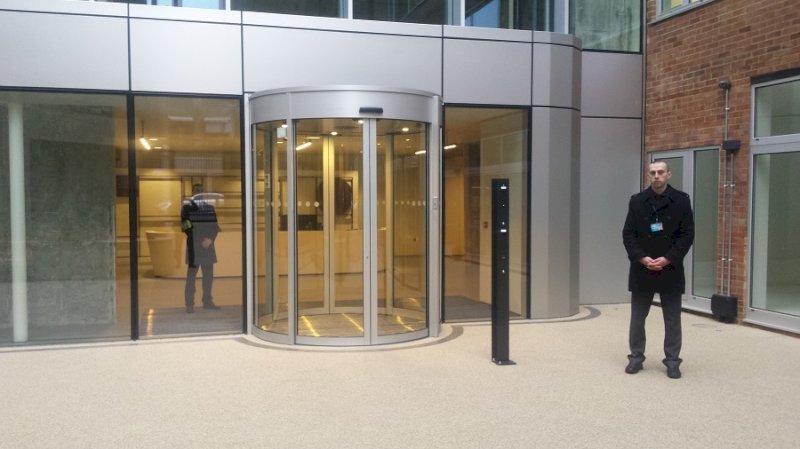Why Retail Shops Need Security
2 weeks ago - 3 min read
The Importance of Retail Security
Retail shops implement security measures to prevent theft, ensure staff and customer safety, and create a secure shopping environment. Security solutions such as CCTV cameras, security guards, alarm systems, and access controls deter criminal activity and minimize financial losses. Beyond crime prevention, effective security enhances business operations, reduces insurance costs, and builds customer trust.
Key Security Risks for Retail Stores
Retailers face several security challenges that can impact profitability and safety, including:
- Shoplifting – Opportunistic thieves and organized crime groups steal merchandise, leading to stock losses.
- Employee Theft – Internal fraud, such as register scams and stock theft, can be as damaging as external theft.
- Vandalism – Graffiti, broken windows, and property damage result in costly repairs.
- Anti-Social Behaviour – Unruly customers, verbal abuse, and aggression create an unsafe atmosphere for staff and shoppers.
- Robbery – Criminals may target stores for cash or valuable stock, especially during off-peak hours.
Implementing strong security measures helps mitigate these risks and protect the business.
How Retail Security Works
A combination of physical security, technology, and trained personnel ensures a safe shopping environment. The key components of retail security include:
- Security Guards – A visible security presence deters crime, maintains order, and provides immediate response to incidents.
- CCTV Surveillance – Cameras monitor store activity, deter criminals, and serve as evidence if theft occurs.
- Electronic Article Surveillance (EAS) – Security tags on products alert staff if unpaid items leave the store.
- Access Control – Restricting entry to stockrooms and staff-only areas prevents unauthorized access.
- Alarm Systems – Motion detectors and alarms help safeguard stores from break-ins and alert emergency services when necessary.
A layered approach using multiple security measures ensures comprehensive protection.
Retail Security Costs in the UK
Security expenses vary based on store size and security needs. Estimated costs include:
- Security Guards – £12 to £15 per hour, depending on experience and location.
- CCTV Systems – £1,000 to £10,000+ based on camera quantity and features.
- Alarm Systems – Starting at £500 for basic setups; advanced monitored alarms cost more.
- EAS Systems – From £3,000 for small stores, increasing with size and complexity.
Investing in security reduces theft-related losses, lowers insurance premiums, and enhances store safety.
Legal Powers of Security Guards in the UK
While security guards lack police authority, they can take specific legal actions:
- Citizen’s Arrest – If a crime is witnessed, security guards can detain a suspect until police arrive.
- Use of Reasonable Force – Guards may prevent suspects from escaping, provided force is proportional.
- Banning Customers – Businesses can refuse entry to repeat offenders or disruptive individuals.
- Bag Searches – While guards can request bag checks, customers have the right to refuse unless a store policy mandates it upon entry.
Security guards must follow legal guidelines to protect both businesses and customer rights.
Shoplifting Laws and Consequences
Retailers take shoplifting seriously, and consequences vary based on the severity of the offense:
- Police Caution – Minor first-time offenses may receive a warning.
- Fines or Community Service – More serious cases result in penalties or legal orders.
- Criminal Record – A shoplifting conviction can impact employment prospects.
- Banning from Stores – Many retailers prohibit known shoplifters from returning.
Even minor thefts can lead to prosecution, and businesses often press charges regardless of item value.
Understanding the £200 Shoplifting Rule
Under the Anti-Social Behaviour, Crime and Policing Act, theft under £200 is classified as “low-value shoplifting” and is typically handled in magistrates’ court. However, habitual offenders or organized shoplifters can still face severe legal repercussions.
What Should Shops Do If a Shoplifter Is Caught?
If a shoplifter is apprehended, retailers should:
- Remain calm and avoid physical confrontation.
- Contact security or police if the suspect refuses to return stolen goods.
- Use CCTV footage as evidence. Document the incident for future reference.
Staff should receive training on handling shoplifting situations professionally and legally.
Enhancing Security Without Hiring Guards
Stores that cannot afford security guards can still improve safety through:
- Staff Training – Employees should recognize suspicious behaviour and report concerns.
- CCTV Installation – Increasing camera coverage to monitor blind spots.
- Strategic Store Layouts – Placing high-value items in well-monitored areas.
- Bag Check Policies – Voluntary bag checks at checkout can deter theft.
Simple security adjustments can significantly reduce theft risks.
How to Report Security Guard Misconduct
If a security guard behaves inappropriately, customers or staff can:
- Speak with the store manager or owner.
- Contact the security company if guards are outsourced.
- Report serious violations to the Security Industry Authority (SIA).
Guards must adhere to professional standards and respect customers’ rights.
Conclusion: Strengthening Retail Security
Retail security is essential for protecting stock, staff, and customers. Whether through security personnel, surveillance technology, or employee training, investing in security measures reduces crime and enhances the shopping experience. Since each business has unique risks, security strategies should be tailored to store size, location, and merchandise type.